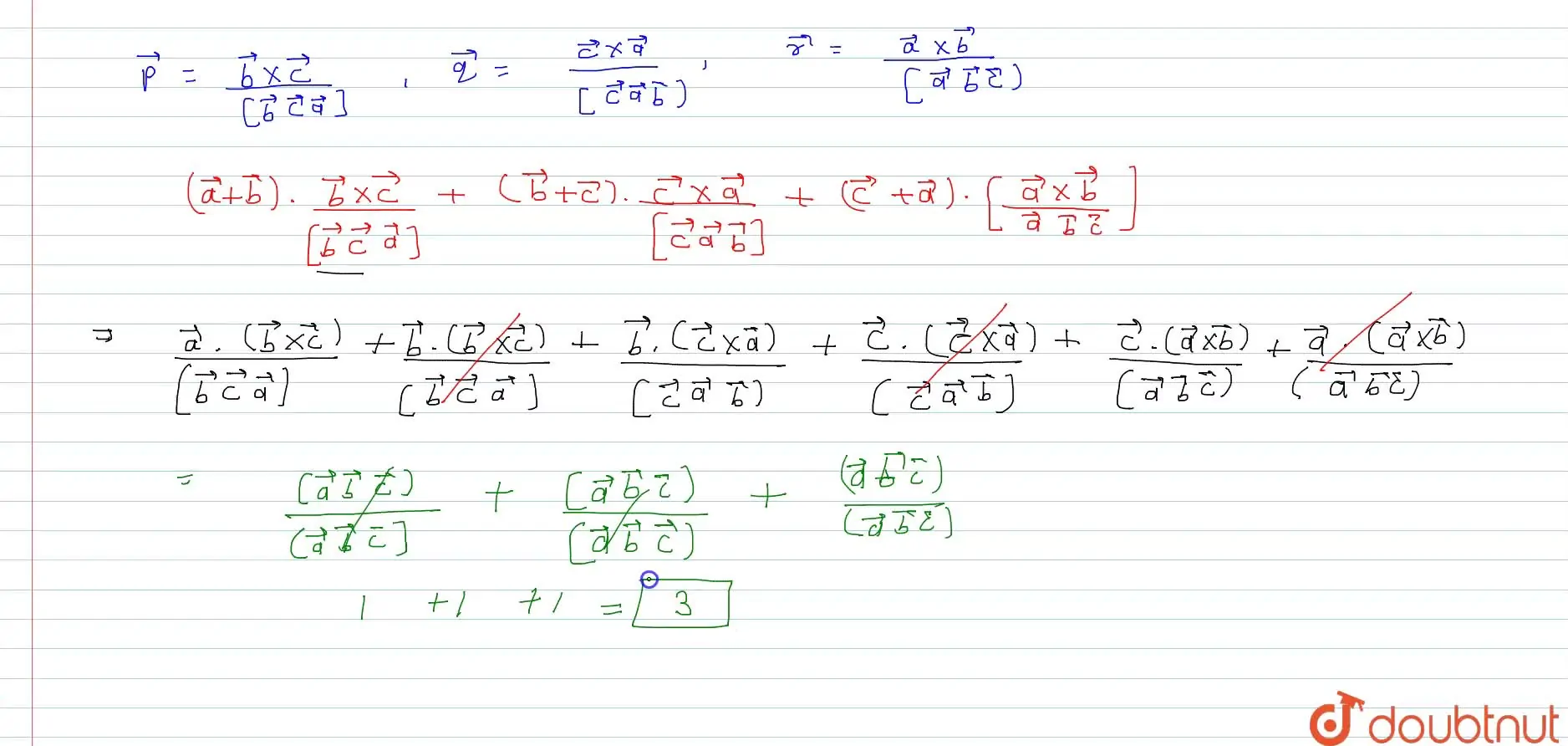यदि →p=→b×→c[→b→c→a],→q=→c×→a[→c→a→b],→r=→a×→b[→a→b→c] हो, तो (→a+→b).→p+(→b+→c).→q+(→c+→a).→r का मान ज्ञात कीजिए |
The correct Answer is:3
Step by step video, text & image solution for यदि vec(p)=(vec(b)xx vec(c))/([vec(b)vec(c)vec(a)]),vec(q)=(vec(c)xx vec(a))/([vec(c)vec(a)vec(b)]),vec(r)=(vec(a)xx vec(b))/([vec(a)vec(b)vec(c)]) हो, तो (vec(a)+vec(b)).vec(p)+(vec(b)+vec(c)).vec(q)+(vec(c)+vec(a)).vec(r) का मान ज्ञात कीजिए | by Maths experts to help you in doubts & scoring excellent marks in Class 12 exams.
Related Playlists
Similar Questions
यदि →a=2ˆi+μˆj−7ˆk तथा →b=λˆi+√3ˆi−7ˆk दो समान सदिश हो, तो λ2+μ2 का मान ज्ञात कीजिए |
04:33View Solutionवक्र y=f(x) के बिन्दु (3,4) पर खींचा गया अभिलम्ब x-अक्ष की धनात्मक दिशा से 3π4 का कोण बनाता है , तो f'(3) बराबर होगा।
14:03View Solutionमानाकि R = {(1, 3), (4, 2), (2, 4), (2, 3), (3, 1)} समुच्चय A = {1, 2, 3, 4} में एक संबंध है, तब संबंध R होगा-
07:24View SolutionIf vec a, vec b, vec c are three vectors such that | vec b | = | vec c | then {(vec a + vec b) xx (vec a + vec c)} xx {(vec b xxvec c)} * (vec b + vec c) =
04:29View SolutionSolve the following equation for the vector vec p; vec p xx vec a+(vec p. vec b)vec c=vec b xx vec c where vec a ,vec b,vec c are non zero non coplanar vectors and vec a is neither perpendicular to vec b non to vec c hence show that (vec p xx vec a+([vec a vec b vec c])/(vec a*vec c) vec c) is perpendicular vec b-vec c.
03:13View SolutionIf vec a,vec b,vec c be any three non-zero non coplanar vectors and vectors vec p=(vec b xx vec c)/(vec a.vec b xx vec c),vec q=(vec c xx vec a)/(vec a.vec b xx vec c) vec r=(vec a xx vec b)/(veca.vec b xx vec c), then [vec p vec q vec r] equals -
04:09View SolutionLet →a,→b,→c be non-coplanar vectors and →p=→b×→c[→a→b→c],→q=→c×→a[→a→b→c],→r=→a×→b[→a→b→c].
What is the value of
(→a−→b−→c).→p+(→b−→c−→a).→q+(→c−→a−→b).→r ?06:55View SolutionIf →a,→b and →c are mutually perpendicular unit vectors and →a×→b=→c, show that →b=→c×→a and →a=→b×→c.
04:15View SolutionIf →a.→b×→c≠0 and →a'=→b×→c→a.→b×→c,→b'=→c×→a→a.→b×→c,→c'=→a×→b→a.→b×→c, show that :
→a.→a'+→b.→b'+→c.→c'=301:45View SolutionIf →a.→b×→c≠0 and →a'=→b×→c→a.→b×→c,→b'=→c×→a→a.→b×→c,→c'=→a×→b→a.→b×→c, show that :
→a'.(→b'×→c')=1→a.(→b×→c)02:26View SolutionIf →a.→b×→c≠0 and →a'=→b×→c→a.→b×→c,→b'=→c×→a→a.→b×→c,→c'=→a×→b→a.→b×→c, show that :
→a.→a'+→b.→b'+→c.→c'=3.03:06View SolutionFor any three vectors →a,→b,→c , show that →a×(→b+→c)+→b×(→c+→a)+→c×(→a+→b)=0
04:37View SolutionIf →a, →b, →c are three vectors such that →a.→b=→a. →c and →a × →b=→a × →c, →a ≠0 , then show that →b=→c .
05:16View SolutionIf →A,→Band→C are vectors such that ∣∣→B∣∣−∣∣→C∣∣. Prove that [(→A+→B)×(→A+→C)]×(→B+→C).(→B+→C)=0
06:12View Solutionसिद्ध कीजिए कि [→a×→b→b×→c→c×→a]=[→a→b→c]2
03:14View Solution


